There's no shortage of tools purpose-built for keyword research (literally hundreds of them), and they run the gamut from beginner-focused to highly advanced. They also range from totally basic and unhelpful to super valuable.
When done right, the best keyword research tools simplify and streamline your workflow—they make it easier to find the right keywords to target and give you the data you need to actually rank for them. But they shouldn't require you to empty out your bank account and sell your first-born child in order to access that data.
After years of working with multiple clients who use all different tools for keyword research and SEO content optimization, I've seen the best (and the worst) of them—and I know how important it is to choose the right keyword planner tool. To help, I considered over 60 tools with a free option for keyword research. After in-depth testing, here are the six best, including the all-around greats and apps built for more specific use cases.
The best free keyword research tools in 2022
- Moz Keyword Explorer for the best all-around free SEO keyword research tool
-
Google Keyword Planner for researching paid keywords
-
Semrush for advanced SEO professionals
-
QuestionDB for finding question-based keywords
-
Jaaxy for affiliate marketers
-
Keyword Surfer for a free SEO keyword research browser extension
What makes the best keyword research tool?
How we evaluate and test apps
All of our best apps roundups are written by humans who've spent much of their careers using, testing, and writing about software. We spend dozens of hours researching and testing apps, using each app as it's intended to be used and evaluating it against the criteria we set for the category. We're never paid for placement in our articles from any app or for links to any site—we value the trust readers put in us to offer authentic evaluations of the categories and apps we review. For more details on our process, read the full rundown of how we select apps to feature on the Zapier blog.
The features that make for a great keyword research tool are pretty straightforward: you search for a given keyword, and the tool tells you about it. But there are so many different ways to use keyword data, so I wanted to find tools that could handle a variety of use cases, along with a few designed for some of the most popular uses for keyword research.
During testing, I looked primarily at the factors below to determine which apps made our initial list.
-
Data included. The best keyword research tools give you all the data you need to rank for your chosen keyword. All of the apps we selected include, at minimum, traffic, keyword difficulty, and competitive SERP analysis.
-
Data sources. You should be able to trust that your keyword data is free of errors and biases, so considering where the data in each keyword research tool comes from was an important step for us. Every tool we included pulls data in from Google Analytics or Google Search Console at a minimum.
-
Keyword optimization guidance. You shouldn't have to be a 10-year SEO industry veteran to use keyword research tools—the best tools offer simple, straightforward suggestions to optimize for your keywords. There are tools (like Ahrefs, Semrush, and Moz) that do complete SEO analysis on your site, checking for everything from site speed and technical details to domain authority and topic clusters. That's not what we're looking for here. We're looking for tools that any business owner or marketer can use to quickly understand their target keyword and optimize their site to rank for it.
-
Free plan allowances and upgrades. Some tools include super limited results for free and call it a "free plan." Or they put time limits on the free plan, effectively making it more of a trial. We only included tools with evergreen free plans generous enough to actually be useful—and they won't break the bank when it's time to upgrade either.
To find the best of the best, I put each tool that checked those boxes to the test by running through an in-depth protocol. Here's what my testing workflow looked like:
-
If needed, I created an account and went through any provided onboarding or guided tutorials (many of these free apps don't require account creation or provide any onboarding).
-
I searched for a few different kinds of keywords—e.g., "free keyword research tools," "chocolate cake," and "best white sneakers"—to see the results for different search intent.
-
I checked which related keywords, metrics, and other data were offered. I also made note of the source, whether information was pulled from Google, included non-search engine websites (like social media or forums), or was drawn from the tool's own native data.
-
I verified allowances for the free plan—whether limited by time, number of results, metrics included, searches per day or month, or something else—and the cost to upgrade to a paid plan if needed.
-
Where available, I tested out additional keyword research tools like competitive gap analysis, content optimization features, and more.
After spending 15+ hours with these apps, I landed on the six best keyword research tools—each with a manageable free version—below.
The best free keyword research tool overall
Moz Keyword Explorer (Web)
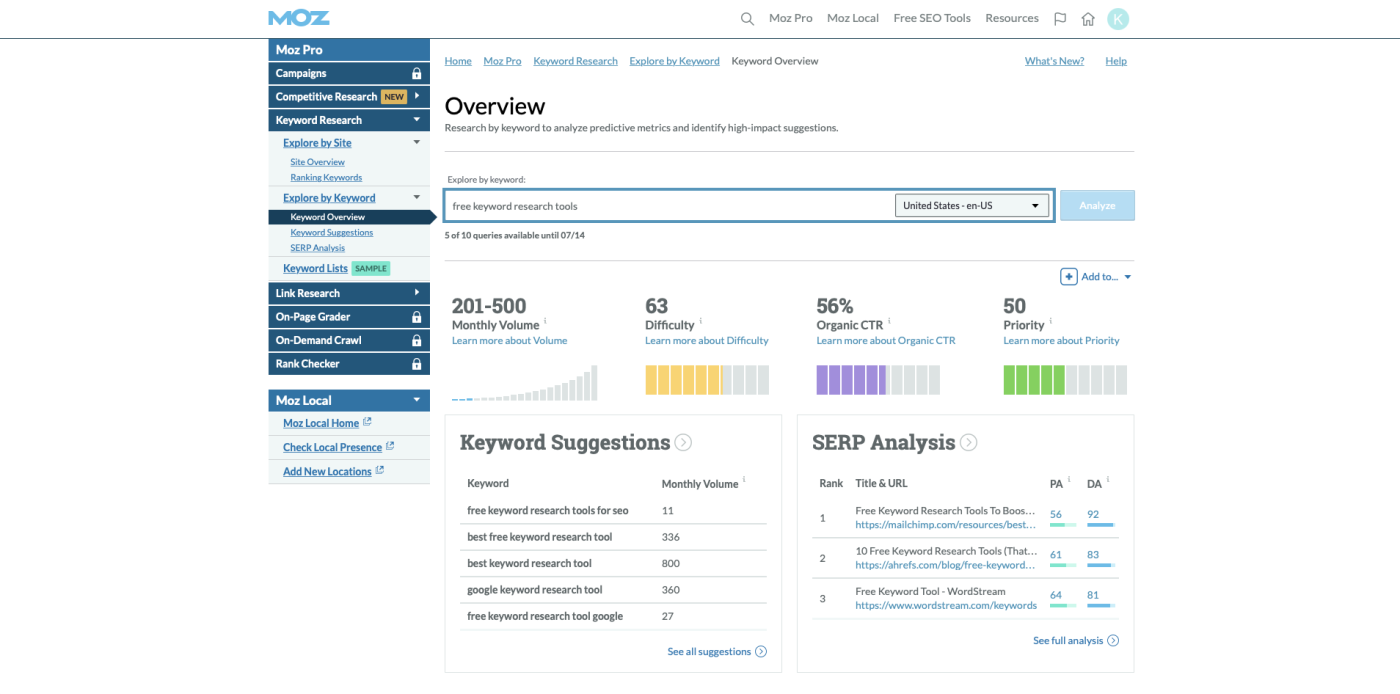
Moz's SEO platform offers several different tools designed for keyword research. While Moz doesn't include as many data points as some of the other full-featured SEO tools (like SERP position history or the total number of keywords a competing result ranks for), we consider that a benefit. It makes for a less overwhelming user experience for those who aren't professional search marketers, without skimping on the metrics you really want.
With the Keyword Explorer tool, you can search any keyword you choose and see its monthly volume, difficulty, and organic clickthrough rate (CTR). Scroll down from there to see analysis of current results ranking for it and suggestions for similar keywords.
My favorite feature: Moz includes a "Priority" score that simplifies keyword research by giving you the bottom line on whether a keyword is worth chasing for you. Moz automatically calculates the score based on the keyword's volume, organic CTR, and difficulty, along with your "My Score"—a metric you set yourself, designating how important a given keyword is to your business, based on your own expertise and knowledge of your business and industry.
Plus, with the new Keyword Gap feature (part of the Competitive Research tool), you can find all the keywords your competitors rank for that you don't.
Moz pricing: Keyword research features are available for free for up to 10 queries per tool per month with up to 1,000 keyword suggestions and SERP analyses per query; Moz Pro plans start at $99/month for 150 keyword queries per month
The best free keyword research tool for paid keywords
Google Keyword Planner (Web)
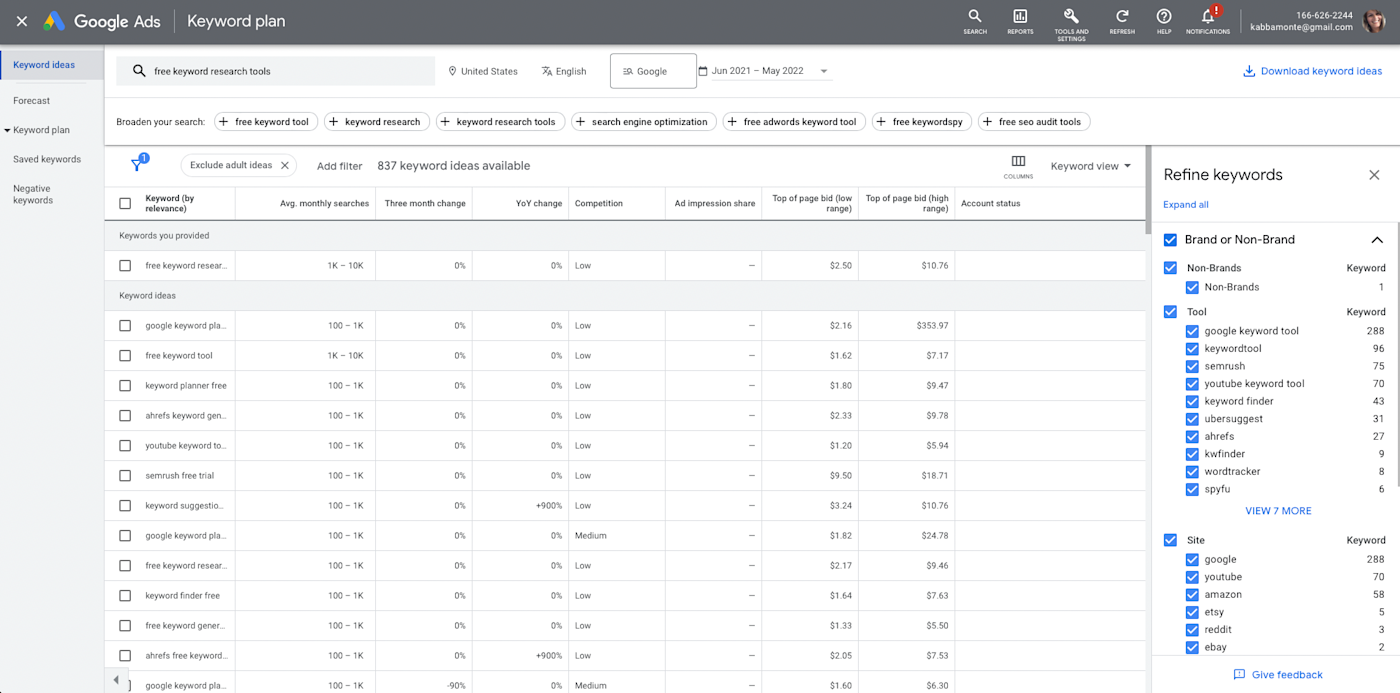
When it comes to PPC keyword research, Google Keyword Planner is one of the best tools out there. It's completely free (even if you don't buy Google Ads), so you never have to worry about running into limits or expensive upgrades.
Google Keyword Planner includes two main features: one for exploratory keyword research and discovery and another for more in-depth research on search volume and forecasting.
The "Keyword ideas" feature is similar to many of the tools on this list: you search for a seed term, and it generates other keyword ideas, along with details on monthly search volume, change over time, competition, ad impression share, and bid ranges. You can refine your keyword list by brand or non-brand keywords, source website, and more. If you're also using Google Ads, the "Forecast" feature makes it easier to plan ahead for your paid ads and budget in advance.
Keyword Planner can inform your organic strategy, too, by showing you where ranking organically may help you save on PPC costs.
Google Keyword Planner pricing: Free
The best free keyword research tool for advanced SEO
Semrush (Web)
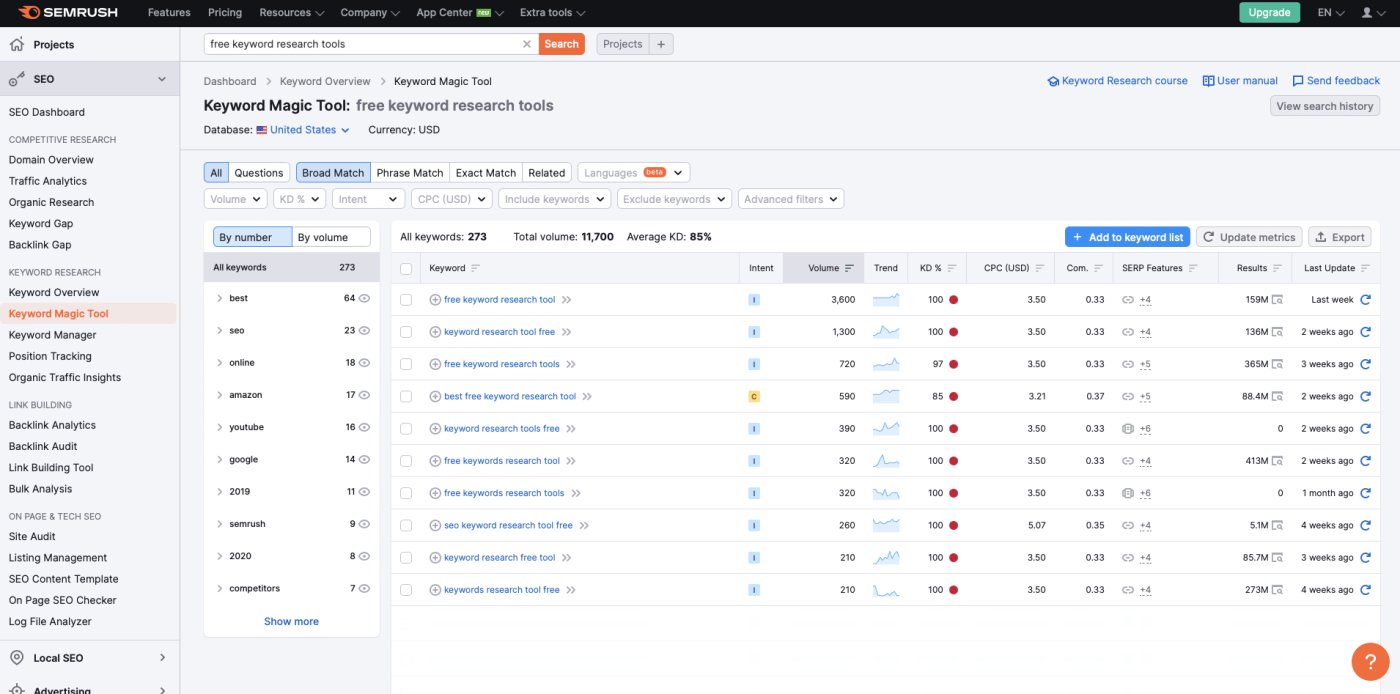
If you're looking for something more advanced, Semrush shares a ton of keyword data and makes it easy to dig into the details, like SERP features (featured snippet, reviews, site links, image pack, and so on) and granular analysis of current results. Semrush offers a broad range of keyword research tools, too, from the standard traffic and search volume data to content-driven keyword research and competitive keyword gap analysis.
That range is what really sets Semrush apart, including the standard Keyword Overview, the Keyword Magic Tool for exploratory keyword research, a Keyword Manager and position tracking, competitive Keyword Gap analysis, and Organic Traffic Insights, which—when connected with your Google Analytics or Search Console account—can uncover those famously tricky "not provided" keywords.
As an added bonus, the SEO Content Template tool lets you automatically create a content brief and optimize content as you write by grading your content in real-time for readability, originality, tone of voice, and SEO: it uses a handy bullseye graphic to help you strike the right balance. Plus, the tool visually checks off SEO recommendations (like using your target and related keywords and adding relevant links and images) as you go.
All of this means that upgrading will cost you a pretty penny—but you can use it for free at low volumes to start.
Semrush pricing: Free plan includes up to 10 Analytics reports per day and 10 tracked keywords; paid plans start at $119.95/month for up 3,000 reports per day, 10,000 results per report, and 250 keyword metrics updates per month.
The best free keyword research tool for finding question-based keywords
QuestionDB (Web)

QuestionDB is among the leanest tools I tested. As the name suggests, you type a keyword or broader topic into the tool, and it brings up a list of related questions people ask online.
What's unique about QuestionDB is the sourcing. While several tools will show you question-based keywords pulled from Google or Bing, QuestionDB scrapes questions from all across the web, including sites like Reddit, Quora, and Stack Exchange—which, of course, are a gold mine of questions.
For example, you might search for a topic like "keyword research." QuestionDB will scrape the web to find common questions people are asking related to keyword research, enabling you to see how, why, and where people are talking about the topic. You can brainstorm content topics, see how people are talking about a topic outside the Google search bar, and get more context on how you should talk about the topic.
QuestionDB pricing: Free for up to 50 results per search; Pro plan includes complete results for up to 500 searches per month for $15/month
The best free keyword research tool for affiliate marketers
Jaaxy (Web)
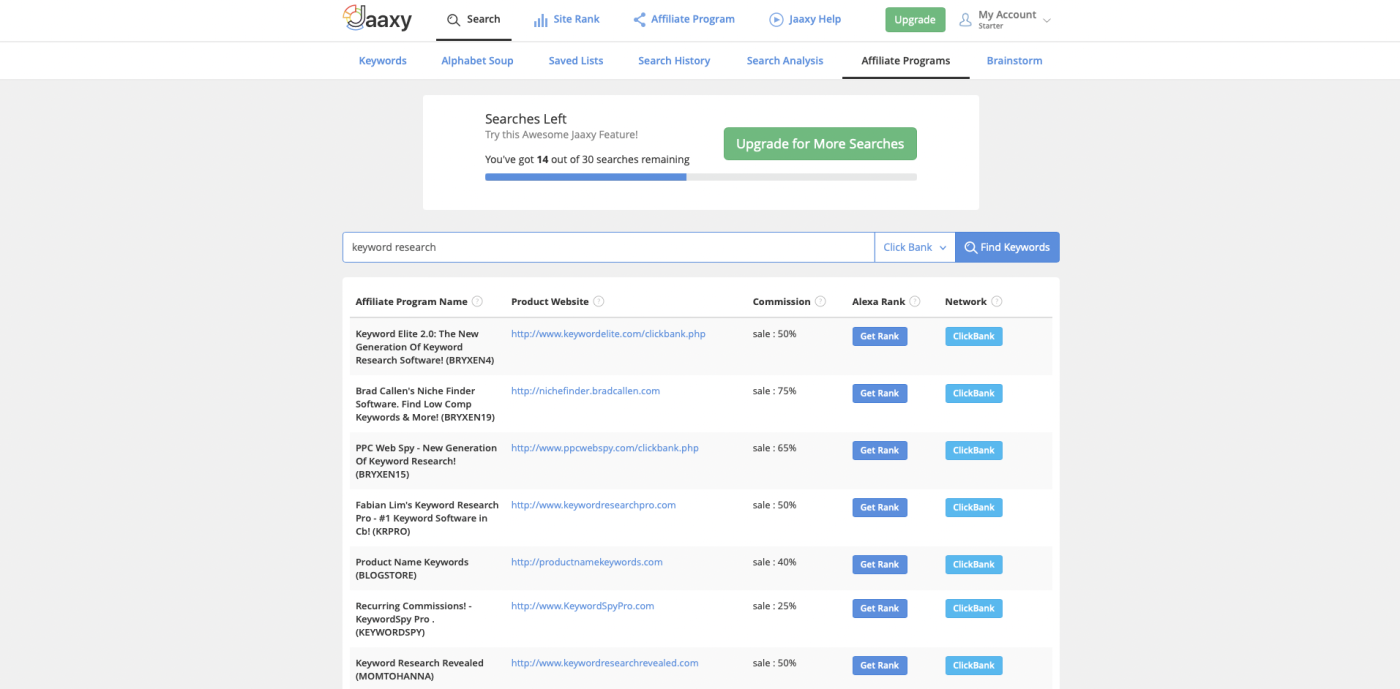
Jaaxy's keyword research tool is pretty straightforward: type in a keyword, topic, or URL, and the tool will give you a list of related and suggested keywords, along with basic stats on each (think average monthly search volume and traffic to page 1 results).
What stood out for me was that Jaaxy helps you find affiliate programs to join and feature on your site. Switch over to the Affiliate Programs tab, and enter your keyword to see a list of affiliate programs sourced from Commission Junction, Link Share, Digital River, and ClickBank. Jaaxy also shows you the listed commission and Alexa Rank for each program and associated product website.
While Jaaxy offers one of the most limited free plans I tested, paid plans offer a reasonably affordable starting point for those monetizing their website through affiliate marketing.
Jaaxy pricing: The first 30 searches are free (with 20 results each) on the limited Starter trial; paid plans start at $49/month
The best free browser extension for lightweight keyword research
Keyword Surfer (Chrome)
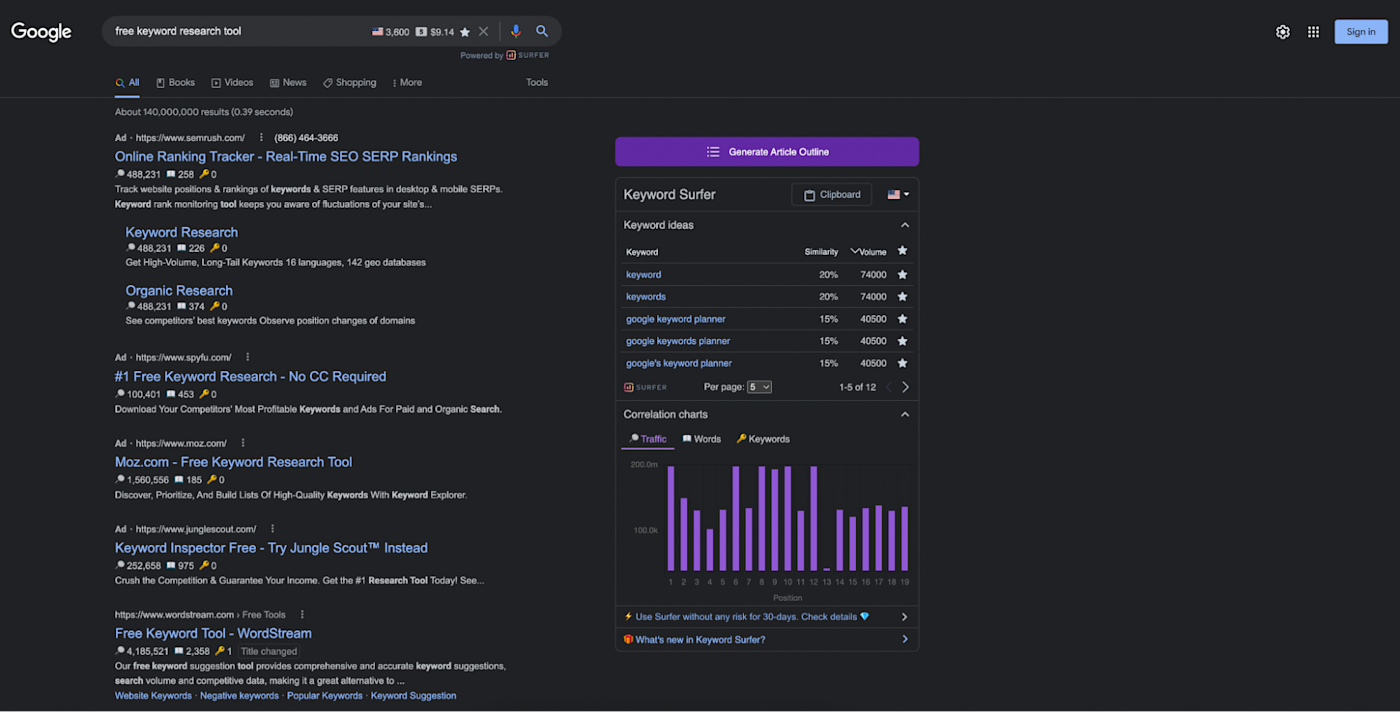
Browser extensions offer a lightweight way to do keyword research without ever leaving the search engine results page. Keyword Surfer, a Google Chrome extension from Surfer SEO, is separate from the full SEO suite and offers a limited version of the platform for free.
Once you download and enable the extension, head to Google and search for your keyword the same way you'd do a normal Google search—you'll see estimated search volume and CPC data populate in the search bar as you type. Hit enter to see the same info, plus the number of exact match keywords on the page for each SERP listing.
Related keywords and visualizations of the SERP data are on the right-hand side. Also on the right, you can click to generate an article outline using the Free AI Article Outline Generator. You'll see a list of all the keywords you should include in your content, plus a suggested heading hierarchy. You can even share the outline with a simple link.
If you opt for the full Surfer SEO app, you can access the full Content Editor (including free WordPress and Google Docs extensions), with an overall "Content Score" and suggestions on how many headings, paragraphs, and images to include.
Keyword Surfer pricing: The Chrome extension and Free AI Article Outline Generator are free; paid plans of the full Surfer SEO suite start at $49/month for the full content editor (with 10 articles per month), SERP analyzer, and other SEO features
This article was originally published in June 2021 and has since been updated.